From the Library of Porpentinus Cripplewort
Some NOTES ~
on the
Geography, Peoples, &
HISTORY
(Natural and Humane)
of the
Strange & Wonderful
ISLAND
of
FARNISH,
Compiled and Indexed by Porpentinus Cripplewort, Esq., of Farnish
Castle, Isle of Farnish, from his own Various and Sundry Researches.
Written in the
Year of Our Lord
MDCCCXLI
* * *
* *
Facsimile of the Original MS, made by Grobius Shortling, 5th in
direct descent (via a byblow) from the Author, with revisions, and
abridgements, in the year 1967... Porpentinus Cripplewort (1653?-1842)
lived through a period of time that was not to be equalled for extraordinary
changes until the Wright Brothers transformed kites into spaceships.
TRANSCRIBER'S NOTE: The Original
Manuscript runs to over 1000 pages (foolscap). The following booklet
is a drastic abridgement designed only to convey to the interested
reader some of the charm and erudition of the original author. Should
public interest be hereby stimulated, I will in the future issue the
work in its entirety.
There was no table of contents, but the book can be broken down into
these general sections:
--The Topography of Farnish
--Some Curious Fauna
--The Farnishite Barque
--The Casting Thiln
--A Strange Custom
--The Literature of Farnish
|
--People & History
--Farnisham (Nostril)
--Gelling
--Agriculture, Commerce, etc.
--Customs, Festivals, Sports
--Castles & Manors
|
[A note on the illustrations. Lacking the proper equipment, I was unable
to reproduce the original Cripplewort drawings and have re-created some
of them using 'Paintbrush'. Audubon it's not. My apologies. --G.S.]
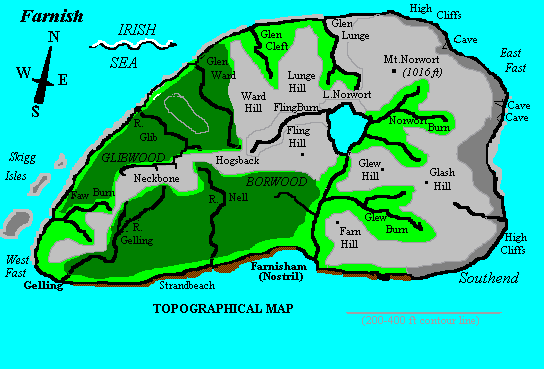
[This is a very large section even in my abridged edition.
I do not have the time or energy to input all this into the
computer at this point in time. Sorry. --G.S.]
Some Curious Fauna
The Grillslug (Arionidus Farnishensus [Limax])
A large mollusk (up to 18" long) inhabiting the GLIB WOOD and BORWOOD.
The flesh is poisonous to eat, but as the Grillslug subsists largely
on rabbits, capturing them by lying wait in their burrows, the Islanders
hold the creatures in high regard. No garden is considered complete
without one, but cats and small dogs must needs be segregated from the
garden Grillslug.

The Helm Snail (Helix helmus)
An extinct species of snail, once highly coveted for its shell,
the circumference of which is great enough for it to be worn on the head.
Old armour always included a Helm Snail helmet for ceremonial occasions,
and after the last Helm Snail was killed in 1374*, Farnishite battle
helms continued to be fashioned in the traditional helical shape down to
the 16th century.
* The last surviving Helm Snail was found in Glen Cleft, but the
Esquire of Lunge claimed that it had strayed from his lands. The famous
Duel of the Helm resulted (see "The Ballad of Helmsduel")
The Red-Breasted Raven (Corvus rubella)
|

|
The Heraldic Beast of Farnish, portrayed on the
Arms, Banners, Ensigns, etc. of the island. |
The Thorn-Billed Egret (Ardea spicus)
An extremely rare migratory bird, nesting in Spring on the East
and West Fasts. The hen lays only one egg per season, regardless of
whether it is fertile or not. It has been reported, without verification,
that these creatures Winter in the Land of Serendip.
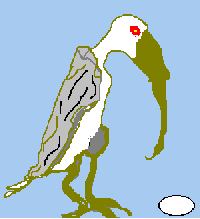
[I was kind of smashed when I 'Paintbrushed' this, but
surprisingly the effect came out just the way I wanted it!
The beak should have been more orangey than greenish. --G.S.]
The Himp Rat (Mus Limpus)
The common Rat of Farnish. Characterised by a long red tail and
curled yellow tusks, the Himp Rat is a carrier of Himp Fever, formerly
called the Green Sweats, a disease, often fatal, in which the victim
literally turns mouldy. The 5th Lord Farnisham (d. 1627) perished from
this malady, as did seven of his eight children. Hugh Greenface, the
Baker, is the only man known to suffer the disease chronically, as one
is usually carried off quickly or recovers suddenly with a shedding of
all skin, which henceforth takes on the characteristic Farnish 'blue hue'.
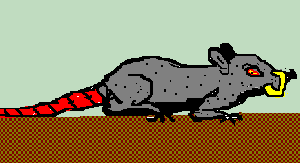
The Tree Pigs (Swinus arboris [Porcus])
Domiciled in GLIB WOOD. Little is known of this arboreal creature
as no one (save for the Treepigg Family, traditional hunters of the
beast) has ever seen one in its habitat. But I can report that they
are delicious to eat.
The Farnishite Barque
An unusual mode of marine transport:
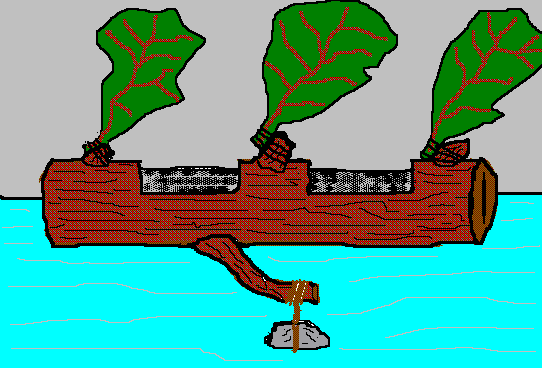
This strange vehicle is still in use by a few fishermen of the village of
Gelling. The Farnishite Barque is actually a hollowed Beech Tree Trunk
(traditionally, this is the only wood used). One long branch is left on
the trunk as a Keel, from which a large stone is hung as ballast. Three
shorter stumps are left topside to which there are attached freshly
cut leafy boughs to serve as a means of propulsion by wind. The barque
shown above seats two persons. The largest known boat of this kind was
said to have seated fifteen.
The Farnishite Casting Thiln
This hunting weapon, the expert use of which is early
inculcated among the Young of the Island, has been utilised since
pre-history. It consists of a foot-long straight Ash stick and a half dozen
large flat stones pierced by a hole and fitting loosely on the stick.
The stones are carried on a specially hooked belt called a Hab. The
missiles are called Runes, from the Runic characters carved on each to
denote ownership. By fitting a Rune on to the stick (or Thiln), one can,
by flicking the latter in the direction of the target, direct the Rune
with considerable force and accuracy at a running or stationary mark.
This is called Casting the Runes.
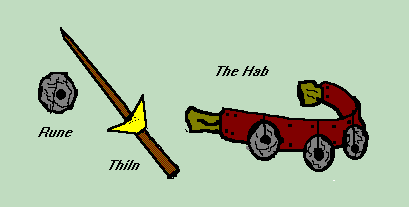
A Strange Custom
HUMBUG DANCING
On Midsummer's Day it is customary to find the Islanders
gathered in the Market Places of Gelling and Farnisham for what is
called the "Humbug Fest." Aside from the usual festive activities (much
drinking of Beer and the local brew Shlug), the most notable event of the
day is the Humbug Dance, which starts at sunrise and continues by relay
until sunset, at which time the best dancer is judged King of the Humbugs
by popular acclaim. The dance is performed with one's hands, while the
dancer is suspended from a tree by ropes.
[A kind of Bungee Hand Jive? Among the uncompiled notes
to the original book, there was a mention that the winner
was often thrown promptly into the harbor. --G.S.]
The Literature of Farnish
There has been but one poet of note in the history of
Farnish. This was Billy 'Maister' Millweel (1750-1848*), who wrote
his first poem at the age of 82, after his retirement from the
Fish-Scaling factory. He produced 8 volumes of poetry...celebrating
the History of the Island -- his best in this vein being the Epic
"Nellie the Bold" --, its topography, and its industries. He also
collected the 22 extant anonymous ballads and songs of Farnish, dating
from c.1500 to the present.... Farnish has produced no writers of prose
or fiction to date [1841]**
* Date of death supplied by the editor. There is a posthumous poem
by the author that records this event.
** The astute observer will have observed a Shortling Isomerism in
this. --G.S.
The People of Farnish and Their History
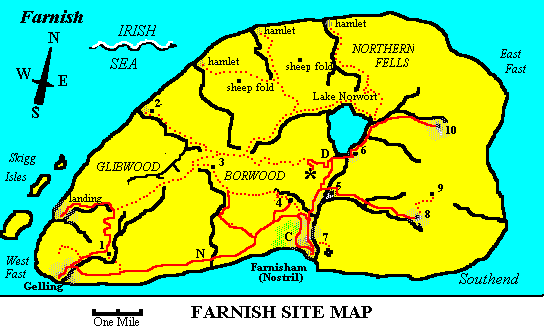
[There are some hot spots on the map that link to references
in the pub section.]
KEY TO SITE MAP
| |
|
Places of Interest
|
Regional Summaries
|
1. Gelling Castle
2. Glib Castle ruins & hamlet
3. Tower ruins in Glib Gap
4. Borwood Hunting Lodge
5. The Mill
6. Loch Norwort Hotel
7. Farnisham Castle
8. Glew Farm
9. Watch Tower
10. Farn Manor estate
|
NORTHERN FELLS: mainly sheep raising
(small farmsteads are located at
the seaward ends of three glens).
WEST FAST: Gelling fishing village
(landing to the north used when bad
southern gales isolate Gelling harbor).
SKIGG ISLES: Uninhabited except for sea
birds; occasional Eremites.
GLIBWOOD & BORWOOD: Mostly Holm Oak
forest; separated by the Neckbone and
Hogsback ridges, crossover at Glib Gap.
C. Farn Common ('The Boggs')
D. Dam & Causeway (enlarges the lake)
EAST FAST: High cliffs along all the east
coast; no reliable landing places. (Some
nice caves, but be careful)
N. Nell Falls beauty spot (overrun by midges
in the summer)
*. Fling Point Overlook (fine views)
LAKE NORWORT: Mountain lake (artificially
deepened in places); the Hotel is a
failed Victorian spa, but is still open
(One has to love stodgy places to enjoy it).
SOUTHEND: Reasonably farmable Downs-like
country; Glew Farm is the main farm of the
island (belongs to the Manor, but in
fact is ruled by Mrs Mabel Mitherglew).
|
|
[Note: There is always a Mrs Mitherglew in a major position of control
in Farnish; the current Mrs M runs the Post Office, Tea Shop &
General Store on the Market Square. -- G.S.]
|
[Well, here we go again.]
[This is a very large section even in my abridged edition.
I do not have the time or energy to input all this into the
computer at this point in time. Sorry. --G.S.]
A note for the curious: Tigti Yellowbeard is reputed to have spent
a period of exile here in the 1050's (see Marshmount Castle).
{Maybe some day I'll put in the rest of this... G.S.}
[The abridged version of Porpentinus Cripplewort's monograph was done in
1967. While updating this for the Internet in 1996, I noticed a glaring
omission, which is hereby remedied. --G.S.]
FARNISH PUB GUIDE (also Restaurants, Cafes, B&B's, etc.)
Should you ever come to visit Farnish (which is not that likely, as it is
a very hard place to find, let alone get to), you might like to know the
following -- in fact, to survive, you HAVE to know.... Although the
island only has about 1600 inhabitants, there are plenty of pubs. Places
to stay, and other amenities (such as public Loos), are very rare. In
spite of its decrepit condition, the LOCH NORWORT HOTEL is your best bet
for a visit to be remembered and cherished, and it is centrally located
(not conveniently, since there is no public transport -- yet they do provide
a mule-cart service when you can stir up the groom).
FARNISHAM, (or to use its archaic name, NOSTRIL):
-
FLATFISH INN. Nice dockside pub, somewhat rowdy; bar food (fish & chips);
some accommodation (crude).
- RED GARTER HOTEL. Fairly rustic pub by the gatehouse (farm-oriented
rather than maritime); bar food (plowman's lunch); NOT a hotel, in spite
of its name--the accommodation is taken up permanently by farm-labor pensioners.
- THE FARNFORK ARMS. Where the constabulary, such as it is, hangs out;
no accommodation (unless you can convince them you are an ex-cop or a
veteran).
- THE MILLER'S LEGS. Right next to the Mill. This is where the island
beer Shlug is brewed, from the chaff from the flour mill (tastes somewhat
like a glass of vodka with a tablespoon of wheat germ stirred into it).
The pub is just a shed; mainly, you bring along empty beer, coke, milk
bottles and have them filled at the tap for take-home. Only open during
work hours (daylight). [Martha Grimes has supposedly written one of her
pub mysteries about this place, but it hasn't seen print yet.] The name
of this place reportedly derives from the miller who managed it some
years ago, when there was a drought, and he kept the millwheels turning
by harnessing himself to the differential and kept the damn thing running
with his own leg power.
- CRIPPLEWORT THEATRE. The only entertainment 'palace' on the island;
small cinema for old movies, mostly B&W Westerns, etc.; Punch & Judy
shows; recitals; school plays.
Site Map
-
DOLPHIN INN. Next to the fish warehouse; smelly and generally awful, but
some yachtsmen (mostly investment bankers) swear by it; limited accommodation,
if you can stand it. Billy Millweel, the poet, used to hang out here 150 years ago, so the place does have some historic interest, and his old seat by the fireplace is still preserved (you aren't allowed to sit in it, but there is no sign that says this).
- THE PLOUGH. Local hangout par excellence; decent local food; the
accents are so thick here, you will not understand anything, especially
on a Saturday night [the islanders think you are making fun of them if
you keep saying 'What?' so be careful--best just to nod and say 'Ayyup'].
Site Map
ELSEWHERE:
- RESTAURANTS. You're out of luck, pal. Mrs Mitherglew's daughter
runs a Tea Shoppe next to the Guildhall in Farnisham; the Fresh Nails
beauty parlor also serves tea and scones; there was an erstwhile hot-dog
stand at Fling Point Overlook, but I don't know if it's still there.
Fresh pickled herring is always available in the Market Squares in
Gelling and Farnisham (on Market Days, which are on the fourth Thursday
of every month, and every Saturday from May to October).
- You can always have a full-course meal at the
LOCH NORWORT HOTEL;
best to arrange in advance. Luigi, when he's sober, can come up with some
very interesting dishes (e.g., Tree Pig Marinara, Grillslug Marsala,
Tosti la Piquante Herring), but normally be prepared for something like
lamb shoulder with cabbage on the side (with mint jelly imported from
Pakistan), and boiled Irish potatoes with skins-on (also imported).
[They call what passes for Yorkshire Pudding here "Yawks-Sir" after an
event in 1898 involving a Yorkshireman and a serving maid; I think
that's kind of quaint.]
- LOCH NORWORT HOTEL. There is actually a bathroom in each wing. The Saloon
is kind of nice, looking out over the lake (service is spotty, but there
is a large hand bell on the bar). Tennis court (better to play Badminton
on this, as the surface is not too good); bowling green/bocchi court (the
latter courtesy of Luigi the cook); paddle boat and canoe rentals.
Site map
- BORWOOD HUNTING LODGE. If you can convince the Porter that you are
descended from the Duke of Clarence, you can get a good Single-malt
Scots whisky here (5 quid into his pocket will do it too). Watch out
for the incredible assholes that might be around in the summer months
who come to 'hunt' (there is no game on the island)--tell them you used
to ride to hounds with Jackie Kennedy and you'll be OK.
- MOONSHINE (Skibbeens). Every place has them; here, if you are
daring enough, try the grotty little house (you can't fail to recognize
it, as it is the only one with a complete roof) next to the Glib Castle
ruins, quite a hike from anywhere. There is also a Dive near the Poorhouse
in Farnisham (behind the Customs House) that serves as the local casino
and bordello; not recommended, unless you are that sort of person
[knock on the red door down the cellar steps and tell them Grobius sent you--
if the bouncer gives you trouble, mumble 'remember the sweaty pig?'].
- BED & BREAKFAST. Knock on someone's door and chat them up; they might
put you up as long as you can prove you are married to your companion.
Don't even bother at the northern 'hamlets'--Cold Comfort Farms indeed.
Web Page and Contents Copyright © 1996, by Grobius Shortling
Last Updated:
|



